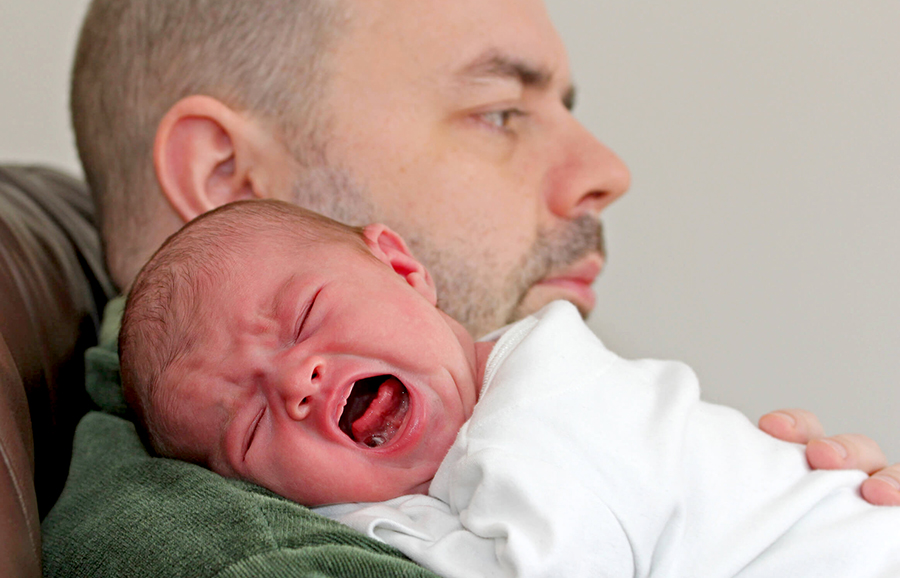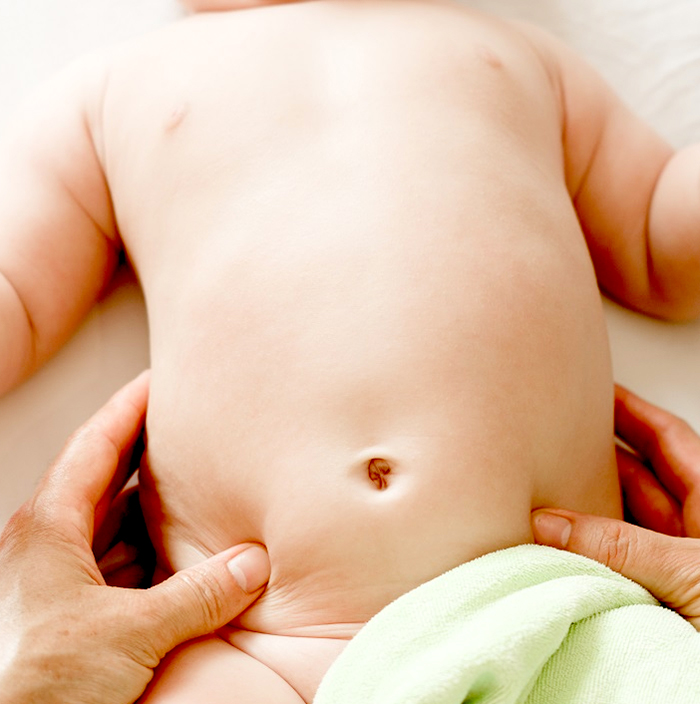Parenting: The “C” Word—Colic
Infant ColicNo, no, not Cancer. I mean the other one – Colic. And believe me, I do know what I’m talking about when it comes to this subject. Let me tell you about Keith….
The “C” Word: Colic
Surviving a baby with colic
by Gregory A. Barrett, M.D.
My wife survived pregnancy, labor, and delivery with our firstborn in rather textbook fashion. But right from the beginning everything about her next pregnancy seemed different – she was sicker, more fatigued, and a WHOLE lot bigger.
To make matters worse she had progressed all the way to the due date, a phenomenon which apparently distresses a pregnant woman to no end. We ignorant males accept the estimated date of confinement as a mere educated guess by the obstetrician regarding our baby’s likely birthday; whereas the female regards it as a drop dead, cast in stone prophecy interpreted as, “Well, I’m sure as heck not going to go THAT long.”
Women consider it an unalienable right to be delivered prior to the predicted time and to be forced to endure the discomforts of the third trimester all the way to a full forty weeks—or, heaven forbid, even longer—is nothing short of catastrophic!

Unfortunately, this was precisely the state in which my better half found herself with number two. And to top it off she then had to deal with telephone inquisitions from friends and relatives demanding an explanation of just why “nothing was happening,” the clear implication being that she was a procrastinator. Needless to say, the Barrett home was not a particularly jolly place as the anticipated day of delivery came and went without even the slightest hint of a contraction.
However, at around five A.M. the following morning, I was lightly shaken by the shoulder arousing me from a pleasant, peaceful, and carefree slumber. I sleepily inquired what was happening and my wife replied that she was having the worst night imaginable, stricken with terrible stomach aches presumably caused by something she had eaten for dinner which hadn’t agreed with her. Furthermore, these cramps were becoming increasingly painful and frequent and were now occurring roughly every five minutes.
“It’s bad enough I’ve had to go all the way to my due date, but now I have to put up with this?” she groused irritably. “That’s just not fair.”
“Hugmhsgmmhm?” I mumbled.
“Yeah,” she said. “And then the silliest thing just happened.”
“What’s that?” I asked, rubbing my eyes and gradually arriving at a state of semi-consciousness.
“Well,” she smiled, shaking her head sheepishly, “I just walked into the bathroom, and I must have wet myself. I mean, I didn’t feel like I pee’ed or anything but there’s water all over the floor.”
“YOU’RE IN LABOR AND YOUR WATER BROKE!” I shouted, immediately reflecting back to my obstetric rotation in medical school and how confusing I found the entire process of childbirth to be as horrific visions of having to deliver the baby by myself in a bathtub danced in my head.
“Oh,” she frowned thoughtfully. “Do you think?”
“Come on, come on, COME ON!!!” I shrieked, fully awake and thoroughly panicked. “GET DRESSED! WE GOTTA GO!! WHERE’S THE STUFF?!?”

We made it to the hospital in time (thank God) and, other than the obligatory pain and suffering, my wife had a relatively uneventful delivery. But that’s when our problems really began.
Basically, all Keith did from the moment he first poked his head into the world beyond the birth canal was bellow! We were forced, somewhat against our will, to leave the sheltered confines of the postpartum unit on the third day, and what we had a taste of in the hospital was instantly confirmed as Keith proceeded to cry nonstop for his first ten hours at home.
He eventually became hoarse from all the screeching losing his voice completely later in the evening, although even then we could still see Keith taking deep breaths and crying angrily but silently. It was kind of funny in a way but at the same time it was incredibly unsettling.
The desperate idea occurred to us to take Keith back to the hospital and see if possibly a mistake had been made, but upon further consideration we realized how unlikely it was that there were any other nine-pound, fourteen-ounce boys with a clubfoot floating around the nursery. Nope, he was ours. We were stuck. And he had infant colic.
Babies are Different, Some Have Infant Colic
To say we were somewhat unprepared for Keith would be a colossal understatement. If ever there was a dream child, it was our daughter Rachel. Her disposition was so sweet it was amazing. We would hear her cooing softly in her crib politely announcing that she was awake, we’d stroll over to her bedroom at our leisure, pick her up, change her diaper, feed her, and after a delightful period of playfulness she would oh-so-gently fuss to let her mommy and daddy know she was beginning to get just a wee bit sleepy, thank you very much.

With Keith we could never determine if he screamed before he opened his eyes or afterwards but every transition from sleep to wakefulness was heralded with a mighty roar. He didn’t wake up – he exploded! And then he just kept on crying.
My experience with Rachel had instilled in me a quiet sense of superiority, mistakenly believing her personality was the natural consequence of my relaxed, steady parenting style, and wouldn’t the world be a far better place if all the little children could have been blessed with a father like me? I did give my wife a small piece of the credit but secretly I felt my cool hand was largely responsible.
Well, Keith’s arrival on the scene put an immediate end to that misconception. My eyes were opened, and I was thoroughly humbled once and for all. Every infant is born with its own innate, individual temperament. Some are easy, others aren’t, and if you happen by a lucky stroke of the heavens to be gifted with a Rachel take my advice and don’t gloat, just count your blessings. Because, believe me, you may not be nearly as fortunate the next time.
A discussion of colic leads to the broader and much more important subject of crying infants in general. In order to become an effective parent there is a fundamental pediatric truth that needs to be understood and accepted which goes as follows:
It is an unalterable fact of life. Although the statement seems ridiculously obvious on the surface – I mean, come on, everybody knows that… don’t they? It is astonishing how often people are shocked by this development. A red-faced, wailing newborn is apparently not what one had envisioned when dreaming of having a baby, and so it is that new parents often find themselves somewhat psychologically unprepared for all the noise. But a baby is going to cry—because that’s what they do.
Infant Colic Means Crying

Infants have very limited means of expression. For newborns there are basically only three possible options from which to choose: they can cry, they can “not” cry, and they can sleep. That’s it, folks. With infant colic, it seems there is only two options: crying or sleeping.
It is not uncommon for a new mother to find herself becoming obsessed with the crying, so much so that if asked her goal for the upcoming day if she were to be perfectly candid the answer would be, “My one wish is that I do not want my baby to cry, and I will do everything in my power to try to prevent that from happening.”
I believe these emotions are derived from the extremely potent maternal instinct which draws the mother to the sound of her baby in distress with a force as strong as nature itself. However, having this as the sole objective not only leads to frustration but is unhealthy in that it will prevent her from enjoying and appreciating all of the other miracles unfolding daily.
Fathers in general seem to be much more objective in their response to crying and fussing right from the get-go. Apparently, the paternal instinct, if such a thing even exists, is infinitely less powerful (I would estimate by a factor of about a hundred thousand million billion).
Paradoxically, a pediatrician would be far, far more concerned about a baby who NEVER cried than one who bawled with vigor on a regular basis. So, it is okay if your baby cries, that’s just one of the few options of communication they have, and the sooner parents accept it as a normal part of infancy the better off they will be.
Colic in the simplest definition is excessive crying in the first three months of life, with a heavy accent on the word EXCESSIVE. It is quite distinctive and easily recognizable. Once you’ve seen it and heard it you will never forget it, kind of like croup in that regard.
There is a constant agitation and inconsolability about these kids. They just look miserable. Keith was somewhat atypical in that he didn’t follow the classic arc of onset at around two weeks of age, gradually worsening until six weeks, leveling off between six and eight weeks, and then improvement with relative resolution by three months.
All newborns follow this track in their daily crying to some degree but with infant colic it is inestimably worse. In addition, there seem to be two distinct variations of colic – in some the spells are episodic in nature, whereas in others the irritability is semi-continuous.
What Works?

Occasionally there is an underlying medical condition mimicking colic but that is seldom the case. These babies are universally gassy so pediatricians may offer gas drops and go through formula changes, usually to little or no avail.
When babies cry, they swallow air and swallowed air leads to the formation of gas. All crying babies have gas, but whether it is causative or merely secondary is the question. There is theoretically a simple way to test this. If gas is causing the crying, gas drops (simethicone) should be effective, but if crying is causing the gas they are essentially worthless. Harmless, but worthless.
The way these babies grunt and strain parents often suspect constipation. However, if the stool is soft that is categorically not the issue and laxative therapies are useless and inappropriate. All newborns spit up to varying degrees, so antacid therapy is often prescribed although the effect is typically marginal unless one is dealing with true symptomatic gastroesophageal reflux.
The breast-feeding mom may be advised to have a brief trial of depriving herself of foods such as chocolate, dairy, and caffeine, but the likelihood of that accomplishing anything is minimal at best.
The most fascinating historic therapy for colic is grippe water, centuries old and still championed by an occasional grandma. Grippe water is an ingenious concoction consisting of sodium bicarbonate, concentrated dill water, tincture of ginger, and what I strongly suspect to be the active ingredient, 4.92% alcohol.
Now, offering the infant one to two teaspoons of a ten-proof liquid which smells like a pickle may indeed quiet the infant temporarily, but I don’t think anyone truly believes that is a reliable or appropriate solution.
Colic is not what it appears to be. These babies look for all the world to be in gastrointestinal distress, but with rare exceptions they are not. They do draw up their legs and cry as if in pain, and they certainly grunt and strain at the passage of even the softest of stools, but there is virtually no evidence that their GI tract functions any differently than the non-colicky infant.
The underlying issue is neurological rather than gastrointestinal and any number of research studies supports this theory. They simply tend to overreact to any stimulus and have tremendous difficulty settling themselves.
There was an interesting clinical study many years ago which was insightful in this regard. With a “normal” newborn clapping hands in front of its face repeatedly at regular intervals led to increasing tolerance, eventually the child ignoring the sound altogether.
But the colicky infants responded progressively with each clap, ultimately losing it altogether and crying inconsolably. Interesting perhaps, but not extremely helpful when walking the floor in the middle of the night with Keith and his ilk.
What is Wrong?!

Several thoughts will cross your mind when dealing with excessive crying….
A- You will determine that your baby is starving. (“I’m afraid my mother-in-law was right after all. I guess I don’t have an adequate supply of breast milk. It’s all my fault.”) Babies with colic are fed semi-constantly as it is one intervention which can be reliably counted on to temporarily succeed in quieting them. This is due to the simple fact that it is quite difficult to cry and suck simultaneously. But when these kids are put on the scale rather than starving, they are typically gaining weight at an excessive rate secondary to overfeeding. Scales don’t lie.
B- You will believe your baby is in pain. They certainly appear to be to the casual observer but in actuality there is not a shred of medical evidence to support this theory. And that is why all of the analgesic therapies for colic are invariably doomed to failure.
C- You will conclude that your baby is sad. But think about it, why would he be sad, what would make her unhappy? Now as far as the parents, that’s another matter altogether.
It always amuses me when an erudite study appears analyzing the mental health of mothers of colicky infants and discovers that many of them are depressed. In my opinion that kind of logic puts the carriage before the horse. Hey, YOU just try to deal with a newborn who cries nonstop all day and all night and then tell me how happy you are!
Parenting: the Colic Cycle

The correct answer is actually “D,” none of the above. The baby is simply crying. Acknowledging this is the real key to learning how to handle these children in the most beneficial manner possible. Yes, of course, you must respond, but you must respond APPROPRIATELY. Avoid the trap of over-interpreting the crying; because, if you believe your baby is starving, in pain, or unhappy you may make the mistake of trying to do something about it. When it comes to colic less is far superior to more.
If the underlying problem is overreacting to stimulation, then one must back away and leave the child alone. Attempts to soothe at this point are counterproductive resulting in nothing more than further agitation. The crying infant is one of the very rare situations in which you are advised to resist your natural instincts, and this can be extraordinarily difficult because stressed, exhausted, frustrated parents feel they must do SOMETHING.
However, I would suggest that leaving the baby alone, allowing him to settle himself down, is actually doing something, and it is doing precisely the right thing. At some point Mom and Dad need to accept the fact that their child is healthy, nothing is wrong, and resist the urge to meddle.
I have devised a system I call The Colic Cycle to help parents address the situation of a crying baby in a logical, stepwise fashion. (Please note that this is a universal approach which applies readily to all species of distressed newborns, not just these particular rascals.)
One, is he hungry? Well, if he’s been fed in the last two hours then he is not. Period. End of discussion.
Two, does he need changed? Check him. Easy enough. If dry, move on to the next step.
Number three, is he bored? Does he wish to be rocked, talked to, played with, or held?
If not then please, for your health and for the baby’s, move to step four, which is to place the little fussbudget in a dark, quiet environment and leave him alone. Withdraw all stimulation. Sure, check on him after a while if he continues to cry and start in again at the top of the list, but if numbers one through three still don’t resolve the crying, then repeat step four.
And by the way, those authors who write that under no condition should an infant ever be allowed to cry for more than a couple of minutes should have to face a tribunal consisting of mothers and fathers of colicky babies. They would certainly get an earful from us! This notion is utter garbage, of course, a ridiculous, unfounded philosophy which lays an impossible and completely unfair burden upon guilt-ridden parents for no reason and leads to inappropriate responses which can cause even greater problems down the line.
Sometimes your baby is just going to cry. Life is like that.
It Gets Better

The other critical piece of information moms and dads must have, is to be assured that this will come to an end. Colic is not a permanent situation. Do not allow yourself to think, “Wow, if she’s like this at four weeks what’s she going to be like when she’s sixteen? Good grief, I’m not going to be able to take it!”
It is a distinct entity which passes completely and is not a predictor of future behavior. As a matter of fact, at the end of the day our Keith turned out to be one of the nicest guys in the world.
Parents have been told for generations that colicky babies grow up to be smarter than their peers but I’m afraid this is a myth, A consolation pediatricians have offered as a lifeline to hang onto while driving around the interstate at two in the morning trying to get the overwrought infant to go to sleep.
Most often the crying resolves gradually, the realization dawning some glorious morning that the house is a whole lot quieter. At other times colic literally vanishes overnight with a suddenness which is astonishing.
Blame It On The Doctor
Early in my practice life I had a set of first-time parents with a terribly colicky baby. I had examined this wretched little girl on a number of occasions in the first few weeks but at the two month checkup she was obviously and surprisingly fine. The characteristic wild, frantic movements of her arms and legs and disgruntled look on her face had been replaced by a calm nature and a pleasant smile. I commented on how much better she appeared to be doing and her mother and father readily agreed.
“And Doc, you’ll never believe what made the difference,” offered the dad.
“What’s that?” I asked, then as now, always eager to learn something new.
“Well,” he said, shaking his head, “you see, ever since we brought her home from the hospital we had her crib lying in a north and south orientation.”
“Uh-huh?”
“Yep. And then one evening me and Melissa decided to rearrange the baby’s room and changed Joanie’s bed to east and west.”

“Yes?”
“And that was it. From that point on she stopped her crying.”
I stared at them uncomprehendingly.
“Yeah,” muttered the young mother in an accusatory tone, glaring at me out of the corner of her eye. “We only wish somebody had bothered to tell us about that earlier.”
To this day colic remains something of a mystery, so who am I to say? Maybe there is an astrological component.
I began my career as a pediatrician before I became a father and in retrospect, I realize now I had absolutely no clue what I was talking about when I counseled parents.
Reflecting upon some of the advice I gave back then, I am truly embarrassed. Until you have children of your own you don’t truly understand. And courtesy of my son, one condition I do have a feel for is the crying newborn. Yes, I suppose in the long run Keith was a gift, of sorts.
But it sure didn’t seem like it at the time.
☤


